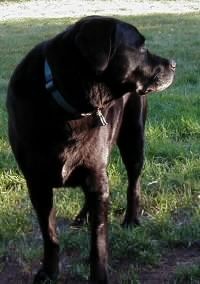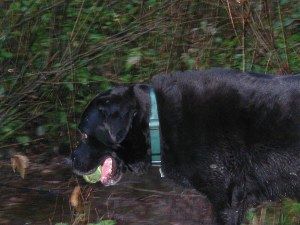Coming Home: The Beginning
Some of the best things that happen to us are accidents and coincidences. Crom and I would agree, I think, that finding each other was just such a fortunate accident. I was in the final days of a failing marriage and needed an obligation to help me cope with unhappiness. I had seen listed in the paper an Akita/Rott mix at the animal shelter, and half as a lark, I stopped by to see this "dream dog." The "Akita/Rott" was pure fantasy. To this day, I can't imagine what demented logic identified the puppy that way. I took one look, and moved on down the noisy aisle.
Farther down was a big adult male named "Gunner." He was forte and beautiful, a mix of some heavy breed with a pointer or spaniel of some sort, noisy and protective of his kennel. He caught my eye and my fancy, even though he would obviously be a challenge. But I could not imagine my wife coping with him, and I wasn't sure I could handle him, so I moved on reluctantly.
To a cage with a single, ten-week-old black puppy, no description provided. He came to the gate, wagging a stump of tail and smiling.  I had the attendant let me in the cage, and the puppy wriggled happily around my feet. Then he piddled on my shoe. "It was," I would tell people for many years, "love at first sight."
I had the attendant let me in the cage, and the puppy wriggled happily around my feet. Then he piddled on my shoe. "It was," I would tell people for many years, "love at first sight."
I called my wife and persuaded her to come and meet him. We took him outside and played with him a bit, and then home to a house suddenly filled with love again, if only reflections. He was ten weeks old when we took him home, so we were close enough in our estimation that his birthday was February 14, 1991.
Crom was obviously half Rottweiler, half Lab. Head-on, he had the blocky look of the Rott, but at a distance, with no defining brown blotches, he seemed a black Lab. A huge black Lab. When he reached maturity, he weighed 120 pounds, and seniority pushed him to 130, then 135. He moved like a horse and had the proportions for the impersonation. Once, as I watched him back out of a tight spot between two benches, the resemblance was uncanny.
His tail had been docked, but improperly (too many vertebrae for a Rott). We always assumed that he was the red-headed child of a Rott with a litter of otherwise purebreds, a by-blow of the woodpile, discarded when it became clear that he would never get his distinctive brown markings. There's no question that his mother, whatever her breed, was a great dog. At ten weeks, he was completely housebroken. In his thirteen years, we had at most a dozen accidents, all of them accountable to sickness or old age. Once I left him home for nearly fifteen hours, while I handled an emergency. I was prepared to excuse and clean up at least one disaster. Instead I found him patiently, if urgently, waiting for me.
We are all fond of our kids, I suppose, so it will be no surprise to hear Crom was a genius. It was a kind of genius I can account for, however. He had full-time attention for his first year, from my self-employed wife and me both. Both of us are intelligent, verbal people, and his vocabulary was well beyond "600 words" by the time he was a teen. Child development specialists will tell you that you establish a child's verbalization skills by talking to them from the beginning, long before they can understand. Couple that with an understanding of the parameters of canine reason, and Crom's "training" was his life. As I said to people amazed at his character, "I didn't teach him to obey, I taught him to behave.
He was a dog of character. He had a sense of humor, and tremendous confidence that never degenerated into aggression. In 13 years, I never saw him start a fight and never saw him back away from one. At 13, crippled with arthritis, he knocked down a belligerent teen Mastiff who outweighed him. He knew who he was, who his pack was, who was dependent on him and who we cared about. And he learned fast.

Rescuing an abandoned tennis ball in the wilds of Stanley Park. It's not just fun; it's a dog's civic duty.
We taught him the difference between old socks that belonged to him by virtue of being given and other socks that were off limits, no matter where they were. Once, as a joke, he got one of my socks from the laundry basket and borught it to me in the office, to remind me that we were supposed to be out walkin'. The "See this?" grin was unmistakable. "You want it, you gotta use it, Pop."
We built his vocabulary with real conversation, not the staccato "inflections" of commands, but precision, repetition, and explanation, simple but not patronizing, like conversation with a child. We constrained our language to his scope. We never joked about "bad." Bad was bad, and not funny. Joking, he was "evil." And "bad" was reserved for his behavior (not that it was needed much); other misbehaving or dangerous dogs were "trouble dogs," and he would eye them with caution and disapproval. We taught him "Be careful," and used it to warn him if he got overeager. He moderated in response. The worst reprimand we used on him was "You hurt me!" and he responded with the embarrassment of a clumsy human. We taught him that gifts of food were to be taken politely, and by the time he was a year old he would lip a single peanut gently from the fingers of my six-year-old niece.
A brilliant mind in the body of an athlete: I was as fortunate in my dog as I was in my children, a son and a stepdaughter who are, with the dog, the pride of my life and my justification when someone asks me someday what I did worth remembering. >I had a hand in the making of these good things. My three children and friends, and of them Crom the athlete. Crom's strength was daunting, and his physical skills amazed me. He could drag me, hanging as dead weight from a chew rope, across a carpeted floor, and I weighed 200 pounds. He once jumped three feet almost straight up, from the chest-deep water of a mud-bottomed lake to an concrete embankment.
His mom, a gentle, delicate woman never quite sure she wasn't about to be trampled, was a bit afraid of his strength, so the first lessons included learning not to "jump up" on his hind legs. He outweighed her by the time he was a year old, so this was a wise decision. One day when I came home, he raced to greet me and when he arrived at my feet, he levitated like Michael Jordan at the basket. Suddenly his face was directly in front of mine, five and a half feet from the ground, and he licked my nose, one swift lick, before dropping to the floor at my feet.
He could move that massive body like smoke, with the grace and delicacy of a dancer, the inevitability of a charging bear. We played "scary dog" games that left me without a scratch after a display of snarling and leaping and lunging that frightened witnesses. Alerted to potential intrusion, he would roar across the yard like a runaway truck; we called that "the bull of Pamplona." Once, after the divorce, his mom came to visit and when she stepped through the front door, he leaped up and raced to her, crossing the hardwood floor full tilt. Disaster? No. He came to a photofinish at her feet, his head against her leg.
When he was a year old, we were visiting my in-laws and someone threw a ball for him, not noticing that my six-year-old niece was directly in his path. He raced across the yard, straight at her, intent on the careening ball. We all ran as well, expecting to pick up a screaming child. Crom, as we said for many years, ran through her, without even mussing her clothes. He veered so delicately, so precisely, that his passing threw up the hem of her dress.
He was a miracle. I will never see the like again.
Contents
- In Memoriam: Crom – Introduction
- Our First Years: Sharing Education
- Dog Humor: By, and About
- The Sacred Bunny: Regarding Toys
- Crom's Death: A Sudden Nightmare, March 23, 2004
- Cautery: Finding Link
- Link's Walk: Some Dog-Walking Tips
- Next Year: March 23, 2005
- Dog Wits and Bird Brains–Essays on Animal Intelligences
- Crom's Own Pages–A Tribute to True Love
- Table of Contents — Dogs and Other Creatures
